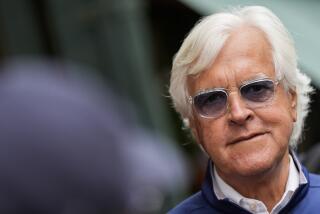STILL A YANKEE DOODLE DANDY : Cauthen Remains One of England’s Top Jockeys 10 Years After Leaving U.S.
- Share via
LONDON — What can you do when you hit the home stretch and you are only 18? Steve Cauthen changed tracks.
In 1977 he was America’s boy wonder. The 17-year old jockey from Walton, Ky., rode an unprecedented 487 winners in one year. He won three Eclipse Awards. The Associated Press, the Sporting News and Sports Illustrated chose him as man of the year when other boys his age were worrying about making their high school basketball teams.
The next spring, Cauthen rode the last Triple Crown winner, Affirmed. And everyone assumed he was the next Bill Shoemaker.
But it all ended suddenly for Cauthen in American racing in the spring of 1979. Cauthen left the United States--fled, skeptics said--to ride on the grassy tracks of England.
Yes, he’d had a bad spill at Belmont and an uncanny losing streak in California, he said, but fleeing was the last thing on Cauthen’s competitive mind. For him, riding in England wasn’t an impulse or an escape, it was a career move. Bigger and better didn’t seem to exist in America.
“I came over here to see how it goes and I have enjoyed it and that is why I have stayed,” said the media-shy jockey.
Much to the delight of British fans, who now claim Cauthen as their own, this spring marks his 10th European campaign.
He has been England’s winningest jockey in three of the last five years. A fall last August finished him for the last third of the season, but he still finished fifth. After a steady but less meteoric climb, he is clearly one of the circuit’s best. The only other jockey in his league is Pat Eddery, the country’s leading active rider.
If Cauthen sought more of a riding challenge, he made the correct choice.
England, the birthplace of thoroughbred racing, has 67 race tracks--each different from the others. Underneath the grassy courses lurk some undulating hills that country gentlemen say give a certain quirkiness to English racing. Both the tracks and the fields are enormous. Fields of 30 are not uncommon, and on the long tracks, races often have only one long turn. On the shorter tracks they frequently have none.
In the United States, even the five-furlong sprints go through the left turn. With slight disrespect intended, the English refer to U.S. tracks as dog tracks because of their perfect, sandy uniformity.
“I like the variety,” Cauthen said after riding a May 1 birthday winner in front of his visiting father.
Prize money is bigger in the United States, but it is not that simple.
“Money isn’t exactly everything,” Cauthen said.
“I am easily bored. I love America in certain ways. Belmont Park in New York, I love racing there. I like California racing. But it’s easy to get in a rut. You go out on the same track every day. Here, at least there’s a heck of a lot of variety.”
And just to maintain that spice, he often rides Sundays in Rome and Paris.
“I am definitely a better jockey now than when I was 18,” he said, adding that he’s not merely more mature and versatile but stronger mentally and physically because of the experiences unique to Europe.
“There are other pluses to riding over here,” he said. “Here, you can take off the winter and do what you want.”
The English season runs from March to October, unlike the year-round racing in the United States. And here, because of its size, jockeys travel all over the country for races and sometimes double up for evening meets when the season gets thick. But they are usually home evenings.
“It’s a different kind of life style,” Cauthen said without a trace of Kentucky drawl, although he doesn’t sound British, either. “I am a country boy at heart.”
American jockeys, if their agents are hustling, might ride eight races a day, six days a week. This routine could go on for months before shifting to a different track in a different city.
“Not that I don’t like the city, but I have been in that rat race full-time,” Cauthen said. “It is a different sort of life style to what I am used to, to what I like. I live out in the (Newmarket) countryside. I have to work hard, I have to travel a lot, but I am at home in a nice place every night and I enjoy that.”
Although Cauthen won his first race here, he was far from an instant success.
No one doubted he could ride, but he had a lot to learn about the different tracks and horses. He also had to prove himself before other owners and trainers would give him the reins.
Australian bookmaking heir Robert Sangster lured Cauthen over to ride for his English stable under veteran trainer Barry Hills.
Under the English system, a top jockey has a contracts with his stable and must give priority to the stable’s horses. A stable might have three horses running in a particular track out of the six races. The stable jockey is committed to those horses, but he can book other mounts for the other races.
The feeling of working as part of a team to get a horse or a string of horses ready provides a special satisfaction you don’t in the United States, according to Cauthen.
“The only way to get to know the people you are working with is to stay with them,” he said. “That doesn’t happen in the States because every five weeks you get sacked, somebody changes, they get mad at you or whatever.”
Said Hills: “Obviously, he was very young and had great potential, but I knew it would take several years to get acclimatized with all these different tracks.”
So when he arrived here, Cauthen moved in with Hills and his family.
“It was kind of like I inherited another son,” Hills said.
Hills has two sons who were 14 and 15 when Cauthen came over. Both are jockeys today.
“I think seeing him around the place spurred them along,” Hills said. “All of a sudden you’ve got this kid who rode 487 winners in one season. It gave them something to look up at.”
Said Brian A. Yorke, Cauthen’s track valet for 10 years: “I first saw him, he was 18. Now he is 28. It’s like seeing people grow up. When he first came over, he was just a young lad, coming to a new country hoping to make good.
“Me and my dad first took care of Steve when he came over. He may have been only 18, but he was already a jockey when he got here.”
A big reputation had preceded Cauthen, but the locker room was never a problem.
“A lot of Americans got a lot of swagger. Not Steve, he’s grown up an Englishman,” Yorke said.
Cauthen has grown 1 1/2 inches, to 5-feet-6, since his arrival here. But he has managed to keep his weight down and customarily rides at 122 pounds, sometimes less.
And that may be another reason for staying here: horses tend to carry a little more weight. But the dieting will always be a struggle, he says with a shrug.
In 1985, after a grueling 195-victory season that produced his second jockey title, he spent part of the winter in a Cincinnati clinic recovering from nine months of fasting and daily riding.
Those who remember his graceful style will be able to pick him out of the crowd, although he has modified the crouch slightly and sits farther down the back than other American jockeys.
In his knee-high English boots, he still rides with his left foot a little lower down the horse, but he has abandoned the American fashion of holding the whip vertically over the horse’s neck. English jockeys always make fun of this habit of their American colleagues. “Steve did that to start,” said John Hanmer, Cauthen’s riding agent. “I don’t know why he switched. Whether it was peer pressure, that he got so much kidding for it in the locker room . . . “
Most agree that Cauthen’s hands--his sense of touch and control--make him an exceptional jockey.
“He can settle a horse better than anyone,” said Hanmer. “And he is a great judge of pace, better when he goes off front, but he can take horses from anywhere.”
The oft-repeated rap against Cauthen, however, is that he doesn’t bring horses up from behind.
Said Hills: “I don’t think he ever had any weaknesses. It was just a question of adapting. He was always a very good rider, a beautiful horseman with lovely hands. Horses would do most anything for him.
“He has been a wonderful ambassador for America, really. He is much-coveted in racing circles.”
Henry Cecil, the stable owner for whom Cauthen now rides, thinks highly enough of him to keep instructions to a minimum.
“We leave it up to Steve to know how to ride the horses,” said Willie Jardine, the assistant trainer at Cecil’s stable for 12 years. “Once he is on a horse, he is one with that horse.
“He doesn’t use his stick as much as other jockeys. He gets as much out of a horse, or more, without using it than they get using it.”
With the Triple Crown races under way in the States, Cauthen does get a little nostalgic, he says.
“Yeah sure, I have fond memories of winning the Triple Crown,” he said. “But I have things here to replace it.
“It is just a question of you can’t be in two places at the same time. I have chosen to do it here and I am enjoying it. One day, maybe it would be nice to think I could have a ride in the (Kentucky) Derby with a real chance. But I wouldn’t want to just have another ride,” he said.
“I sure hope to be back there for the Breeder’s Cup or for the Arlington Million,” though not necessarily this year, he said.
It would depend largely on whether his stable, which wants to expand to the United States, has anything good to send over, Cauthen said.
“I hope I am there, either with Henry or somebody from over here. Or anybody that offers me a good ride from the States. I’d come over if it was a good ride.
“But unfortunately, out of sight, out of mind. People forget to ask you. They think you can’t ride anymore or something.”
But there should be a few more chances, since retirement doesn’t appear in Cauthen’s immediate future.
“I’ll play it by ear,” he said. “Like last year, around Aug. 26. You never know, that could have been the end of it.”
On that date, he suffered a concussion and a cracked sixth vertebra.
But he doesn’t want to diet forever, either.
“Living that sort of restricted diet has got its downside,” he said. “But at the same time I am very ambitious. I am competitive.”
When the time to retire comes, it will be a sudden decision, he said, citing the recent case of a veteran jockey who walked into the locker room after riding a winner and quit the sport.
“That is probably how I am going to quit,” Cauthen said. “I’ll just walk in and say, ‘Right, I have had enough. I am ready to do something else.’
More to Read
Go beyond the scoreboard
Get the latest on L.A.'s teams in the daily Sports Report newsletter.
You may occasionally receive promotional content from the Los Angeles Times.










